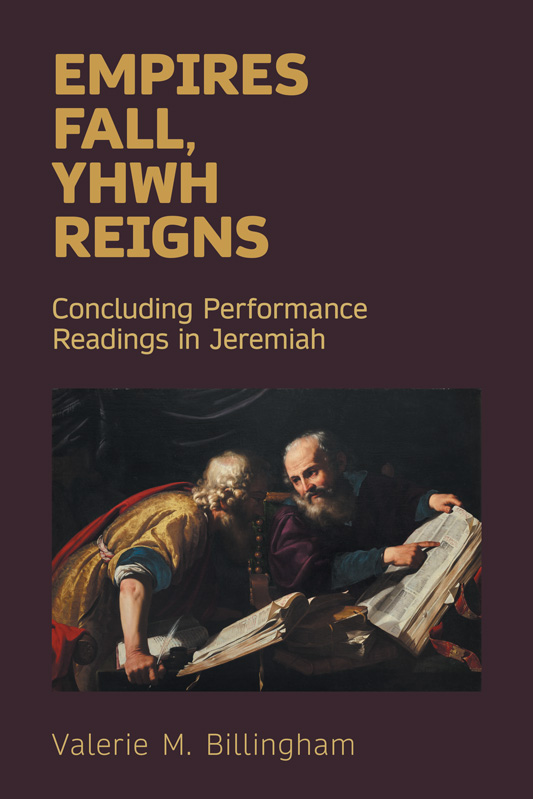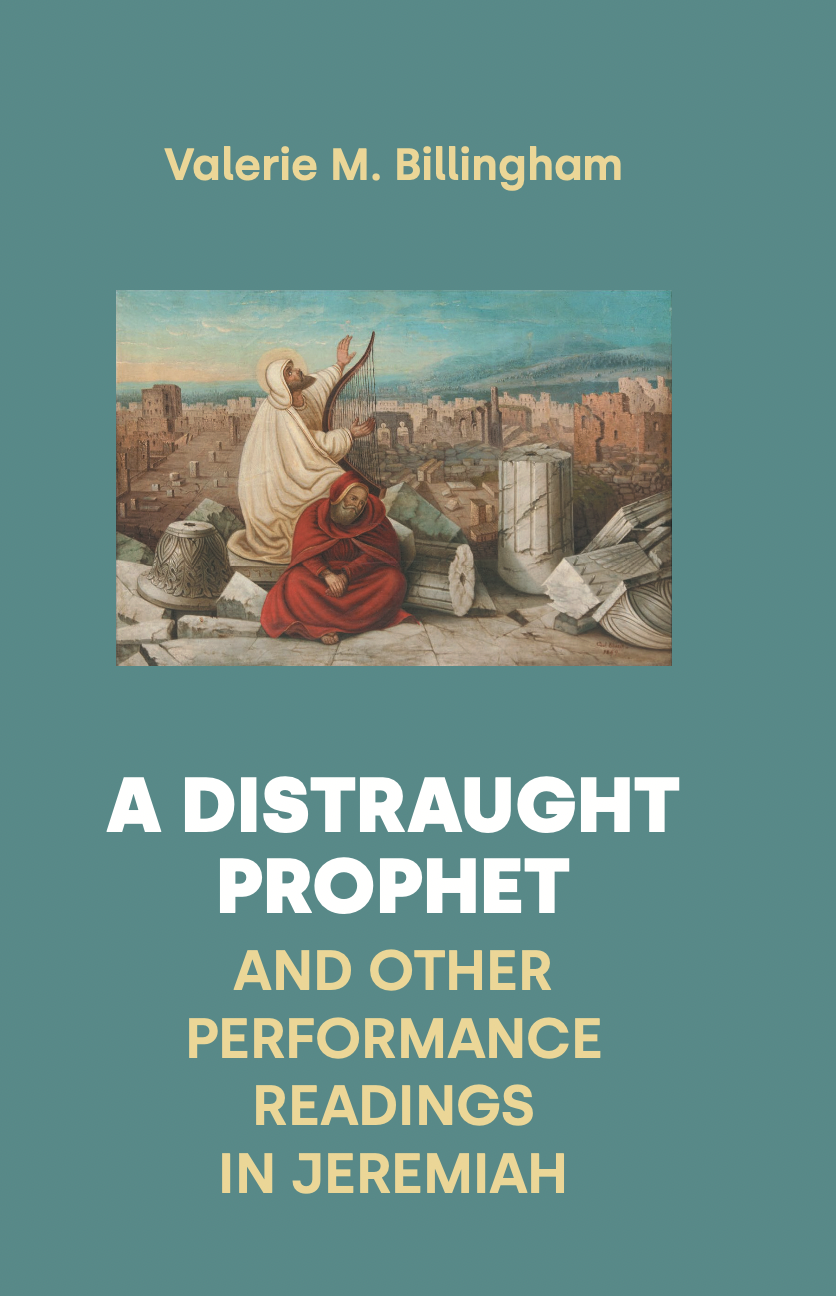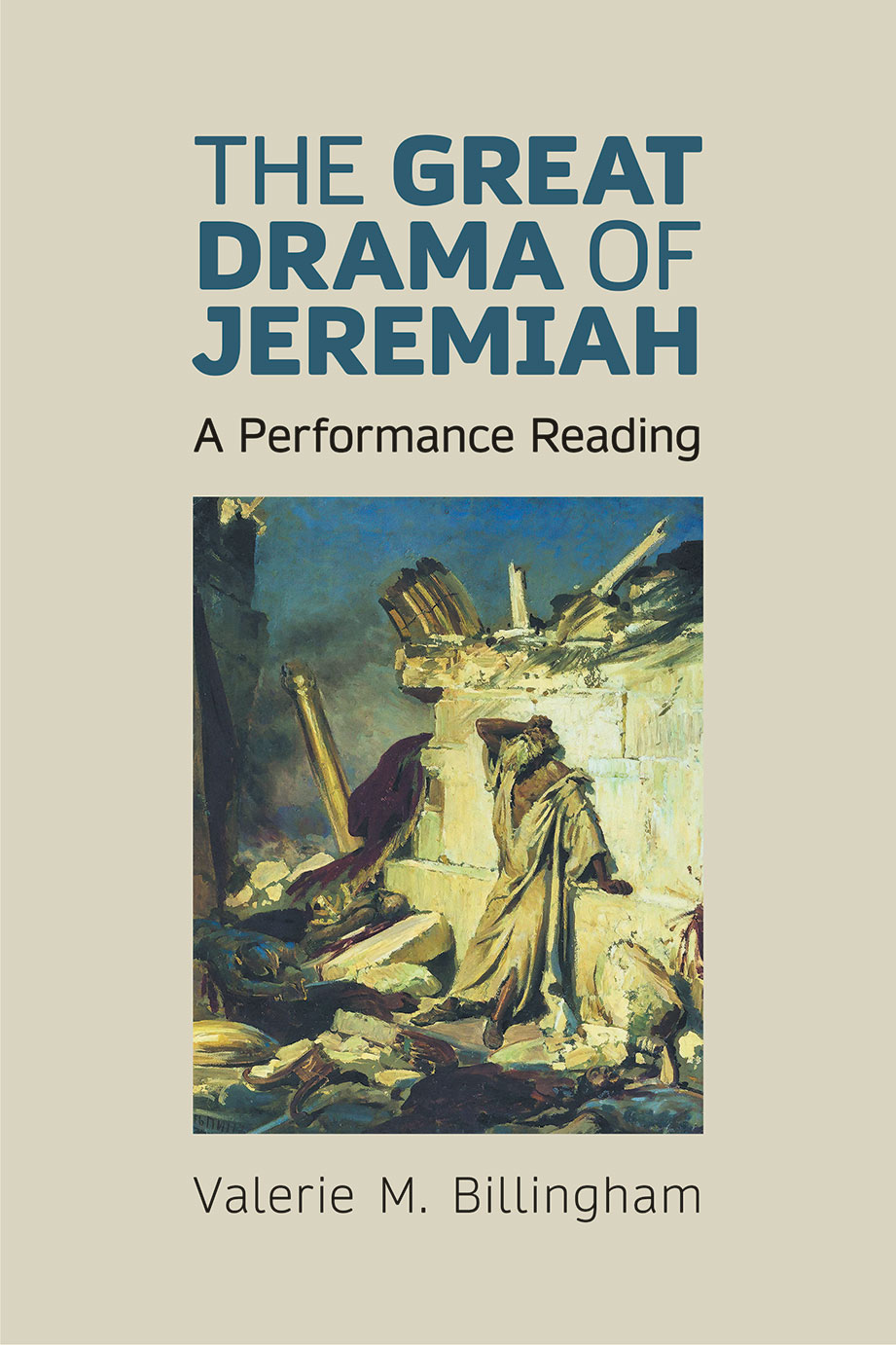Empires Fall, Yhwh Reigns: Concluding Performance Readings in Jeremiah
Published: Oct 2025
£80.00
This work completes Billingham’s performance reading of selected passages in the book of Jeremiah, following two previous volumes: The Great Drama of Jeremiah: A Performance Reading and A Distraught Prophet and Other Performance Readings in Jeremiah. Employing her established methodology that includes rhetorical analyses of her own translations, she discusses ten scenes selected from Chaps. 34-52 according to their scripts, actors, audiences, settings, and improvisations of traditional narratives and customs. Ancient Near Eastern historical accounts are enlivened as they are viewed as dramas.
- In a life and death struggle between the word of Yhwh and the king, the scroll is read and burnt by King Jehoiakim. However, the divine word is indestructible as it is recomposed by Jeremiah and rewritten by Baruch to produce an enhanced version.
- During the Babylonian siege of Jerusalem, Jeremiah is incarcerated in various prisons. However, he is rescued from a dungeon by the Ethiopia eunuch Ebed Melech. The unexpected and unsolicited kindness he experiences provides a hopeful paradigm for Yhwh’s care for the exilic community.
- The Oracles against the Nations demonstrate Yhwh’s international power and covenantal commitment to Judah.
- In a sign-act Jeremiah ties Yhwh’s judgment oracle to a stone and flings it into the Euphrates River in the heart of Babylon. There, as a silent symbol, it awaits Yhwh’s fulfilment, providing hope for the captive Judeans.
- A tale of two kings and the toppling temple embody the dismantling of Judah’s royal-priestly support structures.
- The conclusion of the book remains open-ended, allowing for the possibilities of survival, return to Judah, and faith in God. While empires fall, Yhwh reigns.
Billingham’s set of performance readings in Jeremiah provide illuminating resources for students, teachers and clergy alike.
Empires Fall, Yhwh Reigns: Concluding Performance Readings in Jeremiah
£80.00
This work completes Billingham’s performance reading of selected passages in the book of Jeremiah, following two previous volumes: The Great Drama of Jeremiah: A Performance Reading and A Distraught Prophet and Other Performance Readings in Jeremiah. Employing her established methodology that includes rhetorical analyses of her own translations, she discusses ten scenes selected from Chaps. 34-52 according to their scripts, actors, audiences, settings, and improvisations of traditional narratives and customs. Ancient Near Eastern historical accounts are enlivened as they are viewed as dramas.
- In a life and death struggle between the word of Yhwh and the king, the scroll is read and burnt by King Jehoiakim. However, the divine word is indestructible as it is recomposed by Jeremiah and rewritten by Baruch to produce an enhanced version.
- During the Babylonian siege of Jerusalem, Jeremiah is incarcerated in various prisons. However, he is rescued from a dungeon by the Ethiopia eunuch Ebed Melech. The unexpected and unsolicited kindness he experiences provides a hopeful paradigm for Yhwh’s care for the exilic community.
- The Oracles against the Nations demonstrate Yhwh’s international power and covenantal commitment to Judah.
- In a sign-act Jeremiah ties Yhwh’s judgment oracle to a stone and flings it into the Euphrates River in the heart of Babylon. There, as a silent symbol, it awaits Yhwh’s fulfilment, providing hope for the captive Judeans.
- A tale of two kings and the toppling temple embody the dismantling of Judah’s royal-priestly support structures.
- The conclusion of the book remains open-ended, allowing for the possibilities of survival, return to Judah, and faith in God. While empires fall, Yhwh reigns.
Billingham’s set of performance readings in Jeremiah provide illuminating resources for students, teachers and clergy alike.
A Distraught Prophet and Other Performance Readings in Jeremiah
Published: July 2024
£80.00
Continuing the theme of Valerie M Billingham’s, The Great Drama of Jeremiah: A Performance Reading which addresses eleven scenes in Jer 1-19, Billingham presents a performance reading of nine further scenes from chs. 20-32. In a synchronic reading, she undertakes rhetorical analyses of her own translations of the Masoretic Text, noting repetitions, chiastic structures, parallelism, alliteration and assonance that add impact to the messages. She analyses each scene according to their actors, audience, settings (geographical and socio-political), and improvisation of traditional scripts.
Employing the Earth Bible Team’s six Eco-justice Principles, she attends to the voices of Earth and members of the Earth community as they express their distress at the Babylonian invasion of Judah, and rejoice at the prospect of the exiles’ return. With the exilic community suffering Post Traumatic Stress, she argues that Jeremiah presents a manual that offers healing and restoration. Acknowledging performance as a worthy pursuit, Billingham provides helpful groundwork for engaging with texts in order to produce scripts for acting.
The performances presented include Jeremiah's distress at Yhwh's apparent deception and coercion regarding his prophetic vocation. The kings are the problem in Judah, provoking Yhwh’s judgment, but plans to appoint an ideal leader who will rule according to the covenantal qualities of wisdom, justice and righteousness. Two baskets of figs represent the exilic community and those who remain in Judah. In a twist, the good figs are identified as the suffering exiles, and the bad figs are those who avoided deportation. In a heated clash over the severity and duration of exile, yokes are smashed and Jeremiah is declared to be the true prophet of Yhwh. Jeremiah purchases his uncle’s block of land. An ecological reading presents the field as a silent symbol of hope for the exilic community. It represents all the other fields that will be restored to the rightful families of the returning exiles.
A Distraught Prophet and Other Performance Readings in Jeremiah
£80.00
Continuing the theme of Valerie M Billingham’s, The Great Drama of Jeremiah: A Performance Reading which addresses eleven scenes in Jer 1-19, Billingham presents a performance reading of nine further scenes from chs. 20-32. In a synchronic reading, she undertakes rhetorical analyses of her own translations of the Masoretic Text, noting repetitions, chiastic structures, parallelism, alliteration and assonance that add impact to the messages. She analyses each scene according to their actors, audience, settings (geographical and socio-political), and improvisation of traditional scripts.
Employing the Earth Bible Team’s six Eco-justice Principles, she attends to the voices of Earth and members of the Earth community as they express their distress at the Babylonian invasion of Judah, and rejoice at the prospect of the exiles’ return. With the exilic community suffering Post Traumatic Stress, she argues that Jeremiah presents a manual that offers healing and restoration. Acknowledging performance as a worthy pursuit, Billingham provides helpful groundwork for engaging with texts in order to produce scripts for acting.
The performances presented include Jeremiah's distress at Yhwh's apparent deception and coercion regarding his prophetic vocation. The kings are the problem in Judah, provoking Yhwh’s judgment, but plans to appoint an ideal leader who will rule according to the covenantal qualities of wisdom, justice and righteousness. Two baskets of figs represent the exilic community and those who remain in Judah. In a twist, the good figs are identified as the suffering exiles, and the bad figs are those who avoided deportation. In a heated clash over the severity and duration of exile, yokes are smashed and Jeremiah is declared to be the true prophet of Yhwh. Jeremiah purchases his uncle’s block of land. An ecological reading presents the field as a silent symbol of hope for the exilic community. It represents all the other fields that will be restored to the rightful families of the returning exiles.
The Great Drama of Jeremiah: A Performance Reading
Published: May 2021
£80.00
In this original work, joining the growing corpus of performance criticism of Hebrew Bible texts, Billingham offers a performance reading of some eleven scenes in the book of Jeremiah, analysing their scripts, actors/speakers, audiences, settings and improvisation of scripts. While kings, priests, prophets and people act in various ways in these performances, Jeremiah himself plays an important role both in reporting their actions and in delivering speeches proclaiming Yhwh's oracles. Earth and members of the Earth community also raise their voices in distress at the absence of the exiled people. The people of the exile themselves can be assumed as the audience if no other is designated in a scene; it will be their role to process the experiences of the drama. Various socio-political and geographical contexts provide safe settings in which they may view the traumatic events that unfold. In a synchronic reading, Billingham argues that Jeremiah improvises several old Israelite traditions, applying them to the new context of exile, challenging the prevailing royal-priestly ideology, and prompting the audience to rethink its beliefs, attitudes and actions.
Among the performances analysed in this book are the divine ultrasound of the pre-natal prophet, Jeremiah's vision of the reversal of creation, the people's search for a single righteous person in Jerusalem, the siege of the city and (horror!) the destruction of the temple. In a ludicrous contest with the idols, the best god wins. And Jeremiah smashes a pot as a sign-act for Judah's destruction. This heuristic reading of Jeremiah invites readers to interact with Jeremiah's messages as dramatic performances that may be brought to life in their own experiences of crisis, challenge and triumph.
The Great Drama of Jeremiah: A Performance Reading
£80.00
In this original work, joining the growing corpus of performance criticism of Hebrew Bible texts, Billingham offers a performance reading of some eleven scenes in the book of Jeremiah, analysing their scripts, actors/speakers, audiences, settings and improvisation of scripts. While kings, priests, prophets and people act in various ways in these performances, Jeremiah himself plays an important role both in reporting their actions and in delivering speeches proclaiming Yhwh's oracles. Earth and members of the Earth community also raise their voices in distress at the absence of the exiled people. The people of the exile themselves can be assumed as the audience if no other is designated in a scene; it will be their role to process the experiences of the drama. Various socio-political and geographical contexts provide safe settings in which they may view the traumatic events that unfold. In a synchronic reading, Billingham argues that Jeremiah improvises several old Israelite traditions, applying them to the new context of exile, challenging the prevailing royal-priestly ideology, and prompting the audience to rethink its beliefs, attitudes and actions.
Among the performances analysed in this book are the divine ultrasound of the pre-natal prophet, Jeremiah's vision of the reversal of creation, the people's search for a single righteous person in Jerusalem, the siege of the city and (horror!) the destruction of the temple. In a ludicrous contest with the idols, the best god wins. And Jeremiah smashes a pot as a sign-act for Judah's destruction. This heuristic reading of Jeremiah invites readers to interact with Jeremiah's messages as dramatic performances that may be brought to life in their own experiences of crisis, challenge and triumph.




